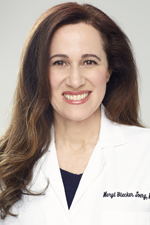For Adults Struggling with Problem Skin, Dermatologist Meryl Joerg, MD with Advanced Dermatology PC, Offers Tips on Non-Antibiotic Treatments.
NEW YORK (PRWEB) January 03, 2019
An increasing number of adults can no longer count on pimple-free skin as a perk of aging. “Adult acne is on the rise,” notes Dr. Meryl Joerg, a dermatologist with Advanced Dermatology PC. “And it can carry serious psychological tolls: depression and disruption of our ability to fully participate in life.”
The statistics are staggering: In the United States, the American Academy of Dermatology (AAD) reports that as many as 50 million people have acne, which in its severe form can be disfiguring and leave scars.
While researchers are still piecing together the puzzle of what causes the condition, we know genetics and hormones are involved. Most adults with acne are women, who experience hormonal fluctuations as they age. Overall, 15 percent of women experience acne – and they count for one in three acne-related visits to the dermatologist. For these patients, research shows that acne can be more distressing than it is for younger people. (cause even deeper levels of distress than for young people.)
“Clearly,” observes Dr. Joerg, “adult acne requires treatment. Fortunately, we have increasing options that include alternatives to antibiotics.”
Antibiotics have been a front line treatment due to the role of the bacteria p. acnes. “If our skin’s regenerative cycle is disrupted,” explains Dr. Joerg, “sebum, the skin’s oil, can trap dead skin cells – and an acne lesion (a pimple) forms. And if we have too much p. acnes – a normally occurring skin bacteria – this triggers an inflammatory cascade that causes more serious acne.”
If antibiotics are to be used, the AAD recommends that patients be prescribed limited courses – and that antibiotics be paired with other treatments. “Our understanding of the potential for antibiotic-resistant bacteria underscores the need for other options,” says Dr. Joerg. “Fortunately, there are many effective non-antibiotic treatments available.”
With that in mind, Dr. Joerg makes the following suggestions:
6 Tips to Clear Adult Acne without Antibiotics:
- Learn the ABCs of the OTCs: “For adults with mild to moderate acne,” says Dr. Joerg, “there are very effective non-antibiotic over-the-counter treatments. Some – like benzoyl peroxide – address the bacteria. Others – like salicylic acid – address clogged pores. Often a dual approach is effective. But it can take up to two months for these medications to make a difference, so being patient is important.
- Treat problem skin with a gentle touch: “We can’t scrub acne away,” observes Dr. Joerg. “In fact, over-cleansing will exacerbate problem skin by stripping essential oils. Using gentle, non-soap cleansers is key, as is moisturizing. Patients should look for the term ‘non-comedogenic,’ which means that the product has been designed so that it doesn’t clog pores.”
- For serious acne, consider seeing a doctor: “Typically, over-the-counter treatments are not suited for serious acne,” explains Dr. Joerg. This is when the dermatologist can help. We have a range of non-antibiotic treatments, from prescription-level topical applications to procedures such as lasers. For severe acne, we can also prescribe the oral retinoid isotretinoin, which has unmatched success – though patients need to be aware of its side effects. An experienced dermatologist can help adults make informed choices and find relief.”
- For women, hormones can help: “Our understanding of hormones’ role,” states Dr. Joerg, “has supported our ability to use combined oral contraceptives to treat women. Modulating the levels of female hormones can adjust the androgens that are tied to acne.”
- Remember: Acne’s after-effects can be treated, too: “Acne can result in scarring and discoloration,” notes Dr. Joerg. “Procedures such as lasers and chemical peels can help alleviate the damage.”
- Stay posted: New treatments are on the horizon: “It’s exciting,” says Dr. Joerg. “Research is giving us a nuanced understanding of the biochemical processes involved, which will hopefully open the doors to new non-antibiotic ways to treat and prevent acne.”
“The idea that acne is an adolescent skin problem,” concludes Dr. Joerg, “is a myth. The good news is we can treat it – and we don’t have to rely on antibiotics to do so.”
Meryl Joerg, M.D., is board certified dermatologist with Advanced Dermatology P.C.
Advanced Dermatology P.C. and the Center for Laser and Cosmetic Surgery (New York & New Jersey) is one of the leading dermatology centers in the nation, offering highly experienced physicians in the fields of cosmetic and laser dermatology as well as plastic surgery and state-of-the-art medical technologies. http://www.advanceddermatologypc.com.

